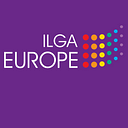The United Nations has identified LGBTI people as a group specifically affected by the war in Ukraine. Here are its recommendations for humanitarian organisations
Working alongside ILGA-Europe, the UN High Commissioner for Refugee has published recommendations for humanitarian actors working with LGBTI people affected by the war in Ukraine.
In all wars, LGBTI people have the same basic needs as everyone else, however, because of their real or perceived sexual orientation, gender identity and/or sex characteristics, they are at higher risk of exclusion and violence.
As ILGA-Europe’s Executive Director Evelyne Paradis explained in our previous blog: “Humanitarian crises affect everybody, however, some communities sometimes need a targeted response because of pre-existing vulnerabilities. These particular vulnerabilities make people feel unsafe when dealing with humanitarian organisations providing safe shelter, basic necessities food and medical aid. Not knowing if they will be treated without discrimination, simply welcomed and be taken care of, is a barrier for people in accessing humanitarian support.”
This is why ILGA-Europe have worked together with the UN, via its Protection Cluster Ukraine, on a list of recommendations for humanitarian actors and service providers working with people affected by the war in Ukraine, so they can better understand and address the risks faced by LGBTI people staying or fleeing the country.
Here are the core recommendations:
Ensure inclusive programming, advocacy and responses
- Collect data that is disaggregated by sex, gender, age and disability as well as data relating to specific protection needs, risks and barriers LGBTI people face.
- Map presence and reach out to LGBTI organisations to learn about their work.
- Establish specific LGBTI reception measures, such as gender-neutral options on registration forms or special hours and days for LGBTI people to register.
- Encourage the active participation of LGBTI individuals in programmes and activities.
- Link specialised LGBTI centres and shelters to the humanitarian aid system.
- Include staff from different genders and backgrounds
- Address barriers for LGBTI people to access social services and programmes
- Include funding opportunities for LGBTI-led organisation in your resource mobilization actions.
- Raise awareness of the situation of LGBTI people affected by the war
- Advocate for non-discriminatory provision of services to LGBTI people by humanitarian actors, civil society organisations, governments and others.
Create safe spaces
- Ensure that staff working in Ukraine are sensitive to the concerns and needs of LGBTI people.
- Respect individual preferences and privacy.
- Communicate through your staff members that your organisation is a safe space
- Seek out and create safe, confidential and effective referral systems and partnerships.
- Advocate for inclusive treatment by medical and healthcare professionals
- Facilitate links between LGBTI people in Ukraine and the wider LGBTI community
- Allow trans, intersex and non-binary people to choose the housing option, scattered-site housing or communal, they believe is safest for them.
Ensure accountability to the affected population
- Consult with LGBTI people on how they want to participate
- Ensure that LGBTI individuals are well informed about their rights
- Ensure that there is two-way communication with LGBTI people via their preferred channels.
- Provide a space where LGBTI people can meet safely
- Engage LGBTI people in gender-based violence prevention and response.
To read the full Protection Cluster: Advocacy Note on Protection of LGBTIQ+ people in the Context of the Response in Ukraine, click here.
ILGA-Europe’s response to the war in Ukraine is a three-fold undertaking, under the heading ‘Information, Action, Direction’. To learn more about what we are doing for and on behalf of LGBTI people caught up in the conflict, click here.
